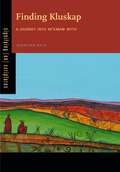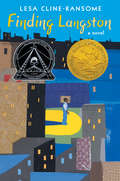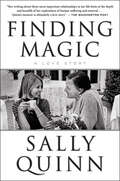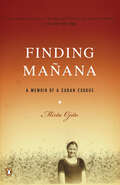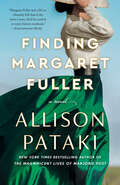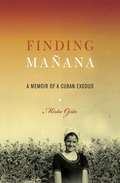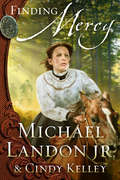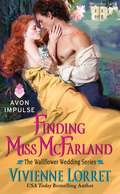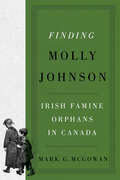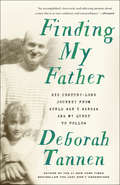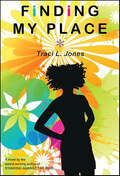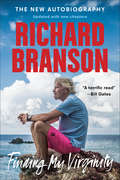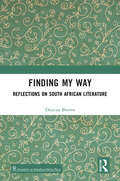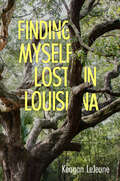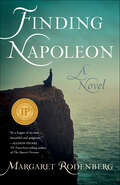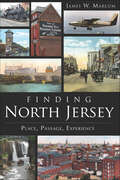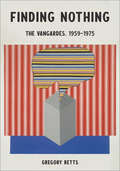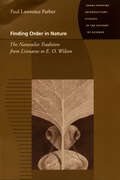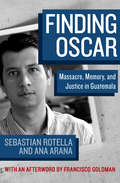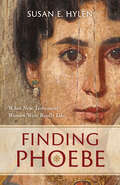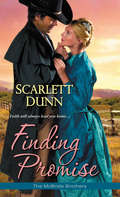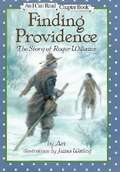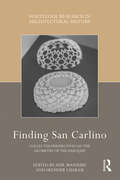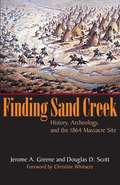- Table View
- List View
Finding Kluskap: A Journey into Mi'kmaw Myth (Signifying (on) Scriptures)
by Jennifer ReidThe Mi’kmaq of eastern Canada were among the first indigenous North Americans to encounter colonial Europeans. As early as the mid-sixteenth century, they were trading with French fishers, and by the mid-seventeenth century, large numbers of Mi’kmaq had converted to Catholicism. Mi’kmaw Catholicism is perhaps best exemplified by the community’s regard for the figure of Saint Anne, the grandmother of Jesus. Every year for a week, coinciding with the saint’s feast day of July 26, Mi’kmaw peoples from communities throughout Quebec and eastern Canada gather on the small island of Potlotek, off the coast of Nova Scotia. It is, however, far from a conventional Catholic celebration. In fact, it expresses a complex relationship between the Mi’kmaq, Saint Anne, a series of eighteenth-century treaties, and a cultural hero named Kluskap. Finding Kluskap brings together years of historical research and learning among Mi’kmaw peoples on Cape Breton Island, Nova Scotia. The author’s long-term relationship with Mi’kmaw friends and colleagues provides a unique vantage point for scholarship, one shaped not only by personal relationships but also by the cultural, intellectual, and historical situations that inform postcolonial peoples. The picture that emerges when Saint Anne, Kluskap, and the mission are considered in concert with one another is one of the sacred life as a site of adjudication for both the meaning and efficacy of religion—and the impact of modern history on contemporary indigenous religion.
Finding Langston
by Lesa Cline-RansomeIn a debut historical novel about the Great Migration a boy discovers Chicago's postwar South Side and the poetry of Langston Hughes. When 11-year-old Langston's mother dies in 1946, he and his father leave rural Alabama for Chicago's brown belt as a part of what came to be known as the Great Migration. It's lonely in the small apartment with just the two of them, and at school Langston is bullied. But his new home has one fantastic thing. Unlike the whites-only library in Alabama, the local public library welcomes everyone. There, hiding out after school, Langston discovers another Langston, a poet whom he learns inspired his mother enough to name her only son after him.
Finding Magic: A Love Story
by Sally QuinnThe author, journalist, television commentator, and longtime Washington insider reflects on the spiritual quest that has brought deeper meaning to her life—and kept her grounded within the high-powered political world of Washington, D.C.’s elite—her renowned writing career, her celebrity marriage, and her legendary role as doyenne of the capital’s social scene.In this emotionally involving, illuminating memoir, the legendary Washington Post journalist, and author talks candidly about her life at the white-hot center of power and the surprising spiritual quest that has driven her for more than half a century.While working as a reporter, caring for a learning-disabled son with her husband, longtime Washington Post executive editor Benjamin Bradlee, reigning over the capital’s social scene, and remaining intimately connected with national politics, Sally Quinn yearned to understand what truly made the world—and her life—tick. After years of searching, most of which occurring in the secular capital of the world, she came to realize that the time she spent with friends and family—the evenings of shared hospitality and intimate fellowship—provided spiritual nourishment and that this theme has been woven into all the most important moments of her life. In this spiritual memoir, Quinn speaks frankly about her varied, provocative spiritual experiences—from her Southern family of Presbyterians and psychics, to voodoo lessons from her Baptist nanny, her trials as a hospitalized military kid in Japan as the Korean War begins, to her adventures as a Post reporter and columnist and her experience as one of the first female news anchors on national television; her battles with the Nixon administration, Watergate, and other scandals that have rocked the nation; her courtship and long marriage to one of the most authoritative figures in the media; her role as the capital’s most influential hostess; and her growing fascination with religious issues. This fascination led to her pioneering work in creating the most visited religious site on the web, OnFaith.co, where she reports on the unseen driving force of American life. Throughout this radiant, thoughtful, and surprisingly intimate memoir, Quinn reveals how "it’s all magic"—the many forms of what draws us together and provides meaning to all we do. Her roller coaster and irreverent but surprisingly spiritual story allows us to see how the infinite wonder of God and the values of meaningful conversation, experience, and community are available to us all.Finding Magic includes 16 pages of exclusive photographs.
Finding Manana: A Memoir of a Cuban Exodus
by Mirta OjitoA vibrant, moving memoir of prizewinning journalist and New York Times reporter Mirta Ojito and her departure from Cuba in the Mariel boatlift—an enduring story of a family caught up in the tumultuous politics of the twentieth century.Mirta Ojito was one teenager among more than a hundred thousand fellow refugees who traveled to Miami during the unprecedented events of the Mariel boatlift. Growing up, Ojito was eager to fit in and join Castro&’s Young Pioneers, but as she grew older and began to understand the darker side of the Cuban revolution, she and her family began to aspire to a safer, happier life. When Castro opened Cuba&’s borders for those who wanted to leave, her family was more than ready to go: they had been waiting for the opportunity for twenty years. Now an acclaimed reporter, Ojito tells her story and reckons with her past with all of the determination and intelligence—and the will to confront darkness—that carried her through the boatlift. In this stunning autobiography, she sets out to find the people who set this exodus in motion, including the Vietnam vet on whose boat, Mañana, she finally crossed the treacherous Florida Strait. In Finding Mañana, Ojito and tell the stories of the boatlift&’s key players in superb and poignant detail—chronicling both individual lives and a major historical event.
Finding Margaret Fuller: A Novel
by Allison PatakiA &“sweeping&” (Entertainment Weekly) novel of America&’s forgotten leading lady, the central figure of a movement that defined a nation—from the New York Times bestselling author of The Magnificent Lives of Marjorie Post&“Soul-stirring . . . brings to life the epic and inspiring story of an incredible woman who should never be forgotten.&”—Kristin Harmel, author of The Paris DaughterIn the company of Ralph Waldo Emerson and his circle of enlightened friends, the young, beautiful, and brilliant Margaret Fuller becomes &“the radiant genius and fiery heart&” of the Transcendentalists. She inspires Louisa May Alcott, sparks Nathaniel Hawthorne to create Hester Prynne, and forms close bonds with Henry David Thoreau and Emerson himself. However, Margaret&’s soul yearns for more than poetry and drama, leading her on a journey of adventure and self-discovery. From hosting a women-only literary salon in Boston to becoming the first woman permitted entry to Harvard&’s library, Margaret defies societal conventions as an activist for women&’s rights and a champion for humanity. On the gritty New York streets, she spars with Edgar Allan Poe and reports on the work of Frederick Douglass. And when offered an assignment in Europe by editor Horace Greeley, Margaret becomes the first female foreign news correspondent, mingling with the likes of Frédéric Chopin, William Wordsworth, and George Sand. In Rome, she embarks on a passionate love affair with a Roman count, causing an international scandal. As a mother and a countess, Margaret enters a new fight for Italy&’s unification. With a star-studded cast and an epic sweep of historical events, this is a story of an inspiring trailblazer, a woman who loved big and lived even bigger—a fierce adventurer who transcended the rigid roles ascribed to women and changed history for millions, all on her own terms.
Finding Mañana: A Memoir of a Cuban Exodus
by Mirta Ojito<i>Finding Mañana</i> is a vibrant, moving memoir of one family's life in Cuba and their wrenching departure. Mirta Ojito was born in Havana and raised there until the unprecedented events of the Mariel boatlift brought her to Miami, one teenager among more than a hundred thousand fellow refugees. <p><p>Now a reporter for The New York Times, Ojito goes back to reckon with her past and to find the people who set this exodus in motion and brought her to her new home. She tells their stories and hers in superb and poignant detail-chronicling both individual lives and a major historical event. Growing up, Ojito was eager to excel and fit in, but her parents'--and eventually her own--incomplete devotion to the revolution held her back. As a schoolgirl, she yearned to join Castro's Young Pioneers, but as a teenager in the 1970s, when she understood the darker side of the Cuban revolution and learned more about life in el norte from relatives living abroad, she began to wonder if she and her parents would be safer and happier elsewhere. <p><p>By the time Castro announced that he was opening Cuba's borders for those who wanted to leave, she was ready to go; her parents were more than ready: They had been waiting for this opportunity since they married, twenty years before. Finding Mañana gives us Ojito's own story, with all of the determination and intelligence--and the will to confront darkness--that carried her through the boatlift and made her a prizewinning journalist. <p><p>Putting her reporting skills to work on the events closest to her heart, she finds the boatlift's key players twenty-five years later, from the exiles who negotiated with Castro to the Vietnam vet on whose boat, Mañana, she finally crossed the treacherous Florida Strait. <p><p><i>Finding Mañana</i> is the engrossing and enduring story of a family caught in the midst of the tumultuous politics of the twentieth century. On the twenty-fifth anniversary of the Mariel boatlift, this is the Pulitzer Prize winner's extraordinary memoir of her childhood in Cuba and her historic journey to America.
Finding Mercy
by Cindy Kelley Michael Landon Jr.When Mercy abandons Captain Elijah Hale to search for her true identity, he goes after her. With the threat that bounty hunters might be hot on her trail, Mercy does all she can to stay ahead of the danger, frustrating both the bad men who are after her--and Captain Hale who wants to find her and escort her safely home. But when she stumbles upon clues that help her learn who she is and where she's from, the danger escalates and she has to learn to keep her friends close and her enemies even closer--if she can determine which is which!This is historical romance with a blend of intrigue from beloved storytellers renowned for their work in film and print.
Finding Miss McFarland
by Vivienne LorretFans of historical romance authors Lorraine Heath and Sophie Jordan will adore Vivienne Lorret's latest Wallflower Wedding novel.Delaney McFarland is on the hunt for a husband--preferably one who needs her embarrassingly large dowry more than a dutiful wife. After the unspeakable incident at her debut, Delaney knows marrying for love is off the table, but a marriage of convenience--one that leaves her free to live the life she chooses--is the next best thing, never mind what that arrogant, devilishly handsome Mr. Croft thinks. Delaney plans to marry for money ... or not at all.Ever since the fiery redhead burst into his life--in a most memorable way--Griffin Croft hasn't been able to get Miss McFarland out of his mind. Now, with the maddening woman determined to hand over her fortune to a rake, Griffin knows he must step in. He must help her. He must not kiss her. But when Griffin's noble intentions flee in a moment of unexpected passion, his true course becomes clear: tame Delaney's wild heart and save her from a fate worse than death ... a life without love.
Finding Molly Johnson: Irish Famine Orphans in Canada (McGill-Queen's Studies in the History of Religion #100)
by Mark G. McGowanIreland’s Great Famine produced Europe’s worst refugee crisis of the nineteenth century. More than 1.5 million people left Ireland, many ending up in Canada. Among the most vulnerable were nearly 1,700 orphaned children who now found themselves destitute in an unfamiliar place. The story Canada likes to tell is that these orphans were adopted by benevolent families and that they readily adapted to their new lives, but this happy ending is mostly a myth.In Finding Molly Johnson Mark McGowan traces what happened to these children. In the absence of state support, the Catholic and Protestant churches worked together to become the orphans’ principal caregivers. The children were gathered, fed, schooled, and placed in family homes in Saint John, Quebec, Montreal, Bytown, Kingston, and Toronto. Yet most were not considered members of their placement families, but rather sources of cheap labour. Many fled their placements, joining thousands of other Irish refugees on the Canadian frontier searching for work, extended family, and the opportunity to begin a new life.Finding Molly Johnson revisits an important chapter of the Irish emigrant experience, revealing that the story of Canada’s acceptance of the famine orphans is a product of national myth-making that obscures both the hardship the children endured and the agency they ultimately expressed.
Finding My Father: His Century-Long Journey from World War I Warsaw and My Quest to Follow
by Deborah TannenA #1 New York Times bestselling author traces her father&’s life from turn-of-the-century Warsaw to New York City in an intimate memoir about family, memory, and the stories we tell. Long before she was the acclaimed author of a groundbreaking book about women and men, praised by Oliver Sacks for having &“a novelist&’s ear for the way people speak,&” Deborah Tannen was a girl who adored her father. Though he was often absent during her childhood, she was profoundly influenced by his gift for writing and storytelling. As she grew up and he grew older, she spent countless hours recording conversations with her father for the account of his life she had promised him she&’d write. But when he hands Tannen journals he kept in his youth, and she discovers letters he saved from a woman he might have married instead of her mother, she is forced to rethink her assumptions about her father&’s life and her parents&’ marriage. In this memoir, Tannen embarks on the poignant, yet perilous, quest to piece together the puzzle of her father&’s life. Beginning with his astonishingly vivid memories of the Hasidic community in Warsaw, where he was born in 1908, she traces his journey: from arriving in New York City in 1920 to quitting high school at fourteen to support his mother and sister, through a vast array of jobs, including prison guard and gun-toting alcohol tax inspector, to eventually establishing the largest workers&’ compensation law practice in New York and running for Congress. As Tannen comes to better understand her father's—and her own—relationship to Judaism, she uncovers aspects of his life she would never have imagined. Finding My Father is a memoir of Eli Tannen&’s life and the ways in which it reflects the near century that he lived. Even more than that, it&’s an unflinching account of a daughter&’s struggle to see her father clearly, to know him more deeply, and to find a more truthful story about her family and herself.
Finding My Place: A Novel
by Traci L. JonesAfter moving to an affluent suburb of Denver in 1975, ninth-grader Tiphanie, the only Black girl in her new high school, feels out of place until she befriends another outsider--Jackie Sue, whose "trailer trash" home life makes Tiphanie's problems seem like a walk in the park. In October 1975, while most teens are worried about their Happy Days Halloween costumes, Tiphanie Jayne Baker has bigger problems. Her parents have just decided to uproot the family to the ritzy suburb of Brent Hills, Colorado, and now she's the only Black girl at a high school full of Barbies. But the longer Tiphanie stays in her new neighborhood, the more her ties to her old community start to fray. Now that nowhere feels like home, exactly where does she belong?
Finding My Virginity: The New Autobiography
by Richard BransonTwenty years after his iconic memoir Losing My Virginity, the world’s ultimate entrepreneur is back with the rest of the story.Richard Branson’s Losing My Virginity shared the outrageous tale of how he built Virgin from a student magazine into one of the greatest brands in history. No challenge was too daunting, no opportunity too outlandish to pursue. And each new adventure started with five simple words: “Screw it, let’s do it.” Now, fifty years after starting his first business, Branson shares the candid details of a lifetime of triumphs and failures and what he really thinks about his unique life and career. Finding My Virginity is an intimate look at his never-ending quest to push boundaries, break rules, and seek new frontiers—even after launching a dozen billion-dollar businesses and hundreds of other companies. As he led Virgin into the new millennium, Branson fearlessly expanded the brand into new categories such as mobile, media, fitness, and banking and into every corner of the globe—all while preserving its iconoclastic, scrappy spirit. He even brought Virgin into space with Virgin Galactic, the world’s first commercial spaceline. Finding My Virginity takes us behind the scenes of the incredible brains, heart, and sacrifices that have gone into making private spaceflight an imminent reality—even after the biggest crisis Branson has ever faced. But this book is much more than a series of business adventures. It’s also the story of Branson’s evolution from hotshot entrepreneur to passionate philanthropist and public servant, via Virgin Unite’s environmental and health initiatives and through the Elders, a council of influential global leaders. And it’s the story of his personal quest to become a better son, husband, father, and “grand-dude” to his four grandchildren. Featuring a supporting cast that includes everyone from Bill Gates to Kate Moss, Nelson Mandela to Barack Obama, this is the gripping account of a man who will never stop reaching for the stars, in more ways than one. Find out how Branson did it for the first time—all over again.
Finding My Way: Reflections on South African Literature
by Duncan BrownThis book reflects on South African literature from the perspective of 2020. It emerges from Duncan Brown’s experiences of three decades of working in this field of writing and scholarship. It is a personal intellectual exploration and an engagement with the institutional history of literary studies in South Africa and elsewhere. Finding My Way also attempts to find more creative, engaging and intriguing modes of writing about literature and the humanities universally. It seeks to recover a sense of the imaginative, the literary, and the affective, not only as things to value in the literary texts we read but also as ways of understanding and reading texts, as ways of writing criticism—of registering how books make us feel, as well as how they make us think. Print edition not for sale in Sub Saharan Africa.
Finding Myself Lost in Louisiana
by Keagan LeJeuneIn Finding Myself Lost in Louisiana, author Keagan LeJeune brilliantly weaves the unusual folklore, landscape, and history of Louisiana along with his own family lineage that begins in 1760 to trace the trajectory of people’s lives in the Bayou State. His account confronts the challenging environmental record evident in Louisiana’s landscapes. LeJeune also celebrates and memorializes traditions of some underrepresented communities in Louisiana, communities that are vanishing or have vanished—communities including the author’s own.Each section in the memoir is a journey to a fascinating place, but it’s also a search for LeJeune’s own sense of belonging. The book is an adventure and a pilgrimage across Louisiana to explore its future and to reckon with feelings of loss and anxiety accompanying climate disasters. LeJeune travels to Louisiana’s geographic center to learn what waits there. He chases the ghosts of Hot Wells, a shuttered healing resort, and he kneels at the tomb of folk saint Charlene Richard. With every adventure, every memory, he ends up much closer to home.
Finding Napoleon: A Novel
by Margaret Rodenberg“Rodenberg inventively uses Bonaparte’s own unfinished novel to tell the story of the despot’s rise to power, which she juxtaposes against the story of his last love affair. Told creatively and with excellent research!” —Stephanie Dray, New York Times and USA Today best-selling author of America's First Daughter and The Women of Chateau Lafayette“Beautiful and poignant.” —Allison Pataki, New York Times best-selling author of The Queen’s FortuneWith its delightful adaptation of Napoleon Bonaparte’s real attempt to write romantic fiction, Finding Napoleon: A Novel offers a fresh take on Europe’s most powerful man after he’s lost everything—except his last love. A forgotten woman of history—the audacious Countess Albine—helps narrate their tale of intrigue, desire, and betrayal.After the defeated Emperor Napoleon goes into exile on tiny St. Helena Island in the remote South Atlantic, he and his lover, Albine de Montholon, plot to escape and rescue his young son. Banding together enslaved Africans, British sympathizers, a Jewish merchant, a Corsican rogue, and French followers, they confront British opposition—as well as treachery within their own ranks—with sometimes subtle, sometimes bold, but always desperate action.Amid his passions and intrigues, Napoleon finishes his real novel Clisson that he started writing as a young man. Now it's a father's message to the young son whom his enemies took from him, but how can they get it to the boy?When Napoleon and Albine break faith with one another, ambition and Albine’s husband threaten their reconciliation. To succeed, Napoleon must learn whom to trust. To survive, Albine must decide whom to betray.This elegant, richly researched novel reveals the Napoleon history conceals and the Countess Albine history has forgotten.
Finding North Jersey: Place, Passage, Experience
by James W. MarcumNorthern New Jersey is one of the most densely populated places in the nation, but it is constantly defined by its relationship to New York City. In this insightful study, longtime North Jersey resident James Marcum asks why, looking well past the false stereotypes to a distinct regional culture and fascinating history. How did North Jersey become what it is today, and even more fundamentally, can we define its boundaries? Is it essentially suburban? What characterizes the region and its people? Join Marcum as he explores these and other issues to come to a better understanding of one of the most intriguing and diverse corners of the Garden State.
Finding Nothing: The VanGardes, 1959-1975
by Gregory BettsExperimental literature accelerated dramatically in Vancouver in the 1960s as the influence of New American poetics merged with the ideas of Marshall McLuhan. Vancouver poets and artists began thinking about their creative works with new clarity and set about testing and redefining the boundaries of literature. As new gardes in Vancouver explored the limits of text and language, some writers began incorporating collage and concrete poetics into their work while others delved deeper into unsettling, revolutionary, and Surrealist imagery. There was a presumption across the avant-garde communities that radical openness could provoke widespread socio-political change. In other words, the intermedia experimentation and the related destruction of the line between art and society pushed art to the frontlines of a broad socio-political battle of the collective imagination of Vancouver. Finding Nothing traces the rise of the radical avant-garde in Vancouver, from the initial salvos of the Tish group, through Blewointment’s spatial experiments, to radical Surrealisms and new feminisms. Incorporating images, original texts, and interviews, Gregory Betts shows how the VanGardes signalled a remarkable consciousness of the globalized forces at play in the city, impacting communities, orientations, races, and nations.
Finding Order In Nature: The Naturalist Tradition from Linnaeus to E. O. Wilson (Johns Hopkins Introductory Studies in th)
by Paul Lawrence Farber“Engaging . . . a concise work that gives the general reader a solid understanding . . . an excellent introduction to the history of natural history.” —Library JournalSince emerging as a discipline in the middle of the eighteenth century, natural history has been at the heart of the life sciences. It gave rise to the major organizing theory of life—evolution—and continues to be a vital science with impressive practical value. Central to advanced work in ecology, agriculture, medicine, and environmental science, natural history also attracts enormous popular interest.In Finding Order in Nature Paul Farber traces the development of the naturalist tradition since the Enlightenment and considers its relationship to other research areas in the life sciences. Written for the general reader and student alike, the volume explores the adventures of early naturalists, the ideas that lay behind classification systems, the development of museums and zoos, and the range of motives that led collectors to collect. Farber also explores the importance of sociocultural contexts, institutional settings, and government funding in the story of this durable discipline.“The history of natural history can rarely have been as succinctly told as in Paul Lawrence Farber’s 129-page Finding Order in Nature. From the intellectual revolutions of Linnaeus and Darwin through the Victorian obsessions with classifying and collecting, to the conservationists led by E. O. Wilson, it is an odyssey beautifully told.” —New Scientist“Farber does an impressive job of demonstrating how practitioners like Linnaeus, Buffon, Saint-Hilaire and Cuvier advanced the field and set the stage for the development of science as we know it today.” —Publishers Weekly
Finding Order in Nature: The Naturalist Tradition from Linnaeus to E. O. Wilson (Johns Hopkins Introductory Studies in the History of Science)
by Paul Lawrence FarberSince emerging as a discipline in the middle of the eighteenth century, natural history has been at the heart of the life sciences. It gave rise to the major organizing theory of life—evolution—and continues to be a vital science with impressive practical value. Central to advanced work in ecology, agriculture, medicine, and environmental science, natural history also attracts enormous popular interest.In Finding Order in Nature Paul Farber traces the development of the naturalist tradition since the Enlightenment and considers its relationship to other research areas in the life sciences. Written for the general reader and student alike, the volume explores the adventures of early naturalists, the ideas that lay behind classification systems, the development of museums and zoos, and the range of motives that led collectors to collect. Farber also explores the importance of sociocultural contexts, institutional settings, and government funding in the story of this durable discipline."The quest for insight into the order of nature leads naturalists beyond classification to the creation of general theories that explain the living world. Those naturalists who focus on the order of nature inquire about the ecological relationships among organisms and also among organisms and their surrounding environments. They ask fundamental questions of evolution, about how change actually occurs over short and long periods of time. Many naturalists are drawn, consequently, to deeper philosophical and ethical issues: What is the extent of our ability to understand nature? And, understanding nature, will we be able to preserve it? Naturalists question the meaning of the order they discover and ponder our moral responsibility for it."—from the Introduction
Finding Oscar: Massacre, Memory, and Justice in Guatemala
by Sebastian Rotella Ana Arana Brian Reed Habiba Nosheen Francisco GoldmanThe harrowing and heartrending story of Guatemala’s Dos Erres massacre, and the survivors whose lives were forever changed by it In 1982, at the height of Guatemala’s civil war, twenty soldiers from the army’s commando unit, called the Kaibiles, invaded the farming village of Dos Erres. Masquerading as leftist guerillas, the squad members cut their way through the small town, killing more than 250 men, women, and children. Only a handful of people survived. One of them, a young boy, was adopted by Kaibil lieutenant Ramírez and raised by Ramírez’s family, who named him Oscar. Just three years old at the time of the massacre, Oscar grew up unaware of his true origins. It wasn’t until almost thirty years later, living in the suburbs of Boston with a family of his own, that Oscar would learn the truth. Drawn from interviews with massacre survivors, commandos-turned-protected witnesses, lawyers, and forensic anthropologists, Finding Oscar is a powerful, groundbreaking investigation into the Dos Erres massacre and its aftermath. It is an unforgettable account of the secret abductions of Dos Erres survivors, the mission to bring the perpetrators to justice, and the courage of the Guatemalan people. This ebook contains content not available anywhere else. Additional features include: A preface by Sebastian Rotella An afterword by acclaimed author Francisco GoldmanOscar’s story is also featured on the May 25, 2012, episode of This American Life, available for download at www.thisamericanlife.org. A slide show, timeline, and details about how this story was reported can be found at www.propublica.org.
Finding Phoebe: What New Testament Women Were Really Like
by Susan E. HylenForget what you think you know about women in the early church. In this learned yet accessible book, Susan E. Hylen introduces first-century primary sources to illuminate readers&’ understanding of New Testament women. Perfect for clergy, spiritual reading groups, and all curious minds, Finding Phoebe combines incisive scholarship and instructional sensibility to encourage readers to develop their own informed interpretations of Scripture. Contrary to popular conceptions of &“biblical womanhood&” as passive and silent, women often served as leaders and prophets in their communities. Women owned one-third of all property during the period, granting them access to civic power through patronage. Many women worked outside the home and were educated according to the needs of their professions. Through careful examination of &“modesty&” and &“silence&” in the Greco-Roman world, Hylen reveals the centrality of these virtues to both men and women practicing self-control in service of communal good. Hylen&’s work will challenge readers to free their minds of modern preconceptions and consider New Testament women on their own terms. This practical book includes historical context, scriptural evidence, and questions for discussion.
Finding Promise (The McBride Brothers #2)
by Scarlett DunnPeril on the frontier challenges the faith of an heiress—and draws a handsome rancher into her life—in this western romance by the author of Promises Kept. She may be an heiress, but Parker Promise Sinclair cares more about living an adventurous life than snaring a suitable husband. So it&’s no surprise when she joins a Colorado wagon train—only to survive a massacre that leaves her with no memory, a target on her back—and her abiding faith tested by the only man who can possibly protect her. His gunfighting skills and trail savvy have saved ex-U.S. Marshal Jake McBride more times than he can count. And his instincts tell him the only way to keep Promise alive is to take her along on his high-stakes cattle drive. But she soon proves she can ride and shoot with the best of them—and Jake finds it increasingly difficult to keep himself from falling for her. Soon, with danger closing in, they'll have only one chance to face their doubts, their fears—and their growing love . . .Named by Booklist as one of the Top 10 Inspirational Books for 2015! &“Promise is a brave, resilient heroine of faith . . . [in] Dunn&’s subtly inspirational western romance. Finding Promise follows Promises Kept in Dunn&’s McBride Brothers series; libraries will want both and those to follow.&” —Booklist, starred review &“An enjoyable historical romance with charming characters. While some of the characters have more grit than grins, it&’s interesting to see them interact. The storyline is believable and flows smoothly, with nice twists and turns. Dunn is a talented author who gives fans what they expect in historical romance.&” —RT Book Reviews
Finding Providence: The Story of Roger Williams
by AviIt's 1635, and Mary and her family live in the Massachusetts Bay Colony where Mary's father, Roger Williams, is on trial for preaching what was then considered radical ideas about freedom and equality. <P><P>When Roger is found guilty, he must escape and travel into the wilderness, where his only hope will be to find his friends the Narragansett Indians. <P> Avi's account of how Roger Williams founded Providence, Rhode Island, is vividly brought to life by James Watling's evocative pictures.
Finding San Carlino: Collected Perspectives on the Geometry of the Baroque (Routledge Research in Architectural History)
by Adil Mansure Skender LuarasiThe church of San Carlo alle Quattro Fontane, also called San Carlino, is an architectural artefact that continues to attract numerous hypotheses and geometric analyses attempting to explain its form and meaning. Numerous investigations have attempted to reveal its underlying geometrical principles, without, however, reaching a consensus. Finding San Carlino presents an edited collection of perspectives on Borromini’s famous Baroque church from a range of established and emerging scholars in architectural history and theory, including Werner Oechslin, Karsten Harries, Michael Hill and Lauren Jacobi amongst others. This book offers the reader different means of engaging with, enjoying and articulating San Carlino’s complexity, non-consensus and ambiguity. It is precisely such a unique disposition that motivates this book to explore multiple modes of architectural enquiry and delve into a series of theoretical and historiographical questions such as: why was Borromini not able to post-rationalize his architecture with his drawings? What is San Carlino’s exemplary value, and why does it continually engender exegetical and hermeneutic desire? What is the role of geometry in architecture, in history and today? Written for researchers, scholars and postgraduate students in architectural history and theory, the book uses San Carlino as an enigmatic centering point for a set of significant contemporary voices to explore new modes of confrontation and comparison.
Finding Sand Creek: History, Archeology, and the 1864 Massacre Site
by Jerome A. Greene Douglas D. ScottHow the Colorado site, where Cheyenne and Arapaho Indians were murdered in 1864, was recently made a national park
